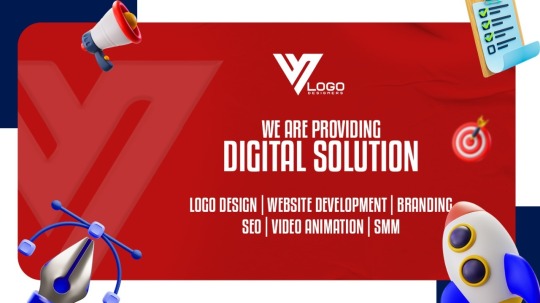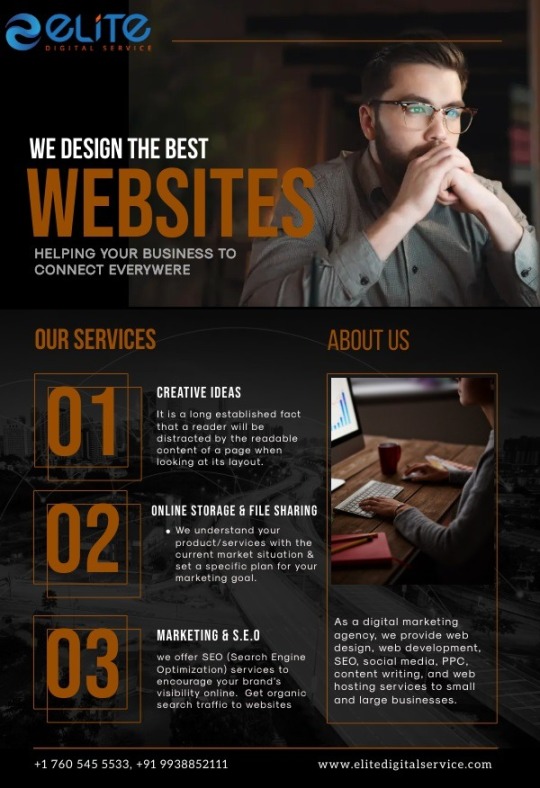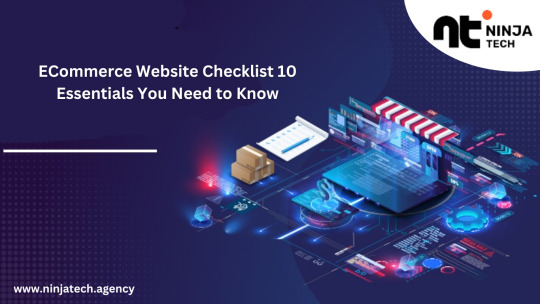#website design & development company in usa
Text
ECommerce Website Checklist 10 Essentials You Need to Know
In the fast-paced world of online business, creating a successful e-commerce website requires careful planning and attention to detail. Whether you're launching a new venture or looking to enhance your existing platform, it's crucial to have a comprehensive checklist in place. In this guide, we'll explore the 10 essentials you need to know to ensure your e-commerce website thrives. Brought to you by NinjaTech, your trusted partner in cutting-edge technology.
#ecommerce website development agency#ecommerce web design company#Web Application Development Company in USA
3 notes
·
View notes
Text
10 security tips for MVC applications in 2023

Model-view-controller or MVC is an architecture for web app development. As one of the most popular architectures of app development frameworks, it ensures multiple advantages to the developers. If you are planning to create an MVC-based web app solution for your business, you must have known about the security features of this architecture from your web development agency. Yes, MVC architecture not only ensures the scalability of applications but also a high level of security. And that’s the reason so many web apps are being developed with this architecture. But, if you are looking for ways to strengthen the security features of your MVC app further, you need to know some useful tips.
To help you in this task, we are sharing our 10 security tips for MVC applications in 2023! Read on till the end and apply these tips easily to ensure high-security measures in your app.
1. SQL Injection: Every business has some confidential data in their app, which needs optimum security measures. SQL Injection is a great threat to security measures as it can steal confidential data through SQL codes. You need to focus on the prevention of SQL injection with parameterized queries, storing encrypted data, inputs validation etc.
2. Version Discloser: Version information can also be dangerous for your business data as it provides hackers with your specific version information. Accordingly, they can attempt to attack your app development version and become successful. Hence, you need to hide the information such as the server, x-powered-by, x-sourcefiles and others.
3. Updated Software: Old, un-updated software can be the reason for a cyber attack. The MVC platforms out there comprise security features that keep on updating. If you also update your MVC platform from time to time, the chances of a cyber attack will be minimized. You can search for the latest security updates at the official sites.
4. Cross-Site Scripting: The authentication information and login credentials of applications are always vulnerable elements that should be protected. Cross-Site Scripting is one of the most dangerous attempts to steal this information. Hence, you need to focus on Cross-Site Scripting prevention through URL encoding, HTML encoding, etc.
5. Strong Authentication: Besides protecting your authentication information, it’s also crucial to ensure a very strong authentication that’s difficult to hack. You need to have a strong password and multi-factor authentication to prevent unauthorized access to your app. You can also plan to hire security expert to ensure strong authentication of your app.
6. Session Management: Another vital security tip for MVA applications is session management. That’s because session-related vulnerabilities are also quite challenging. There are many session management strategies and techniques that you can consider such as secure cookie flags, session expiration, session regeneration etc. to protect access.
7. Cross-Site Request Forgery: It is one of the most common cyber attacks MVC apps are facing these days. When stires process forged data from an untrusted source, it’s known as Cross-Site Request Forgery. Anti-forgery tokens can be really helpful in protecting CSRP and saving your site from the potential danger of data leakage and forgery.
8. XXE (XML External Entity) Attack: XXE attacks are done through malicious XML codes, which can be prevented with the help of DtdProcessing. All you need to do is enable Ignore and Prohibit options in the DtdProcessing property. You can take the help of your web development company to accomplish these tasks as they are the best at it.
9. Role-Based Access Control: Every business has certain roles performed by different professionals, be it in any industry. So, when it comes to giving access to your MVC application, you can provide role-based access. This way, professionals will get relevant information only and all the confidential information will be protected from unauthorized access.
10. Security Testing: Finally, it’s really important to conduct security testing on a regular basis to protect business data on the app from vulnerability. Some techniques like vulnerability scanning and penetration testing can be implied to ensure regular security assessments. It’s crucial to take prompt actions to prevent data leakage and forgery as well.
Since maintaining security should be an ongoing process rather than a one-time action, you need to be really proactive with the above 10 tips. Also, choose a reliable web development consulting agency for a security check of your website or web application. A security expert can implement the best tech stack for better security and high performance on any website or application.
#web development agency#web development consulting#hire security expert#hire web developer#hire web designer#website design company#website development company in usa
2 notes
·
View notes
Text
Sustainability In Digital Marketing : Building Green Brands

Welcome to the future of marketing, where sustainability and innovation go hand in hand. In an era when consumers are increasingly mindful of their environmental impact, businesses have a unique opportunity to not only grow their brands but also make a positive difference in the world. Today, we dive into the exciting realm of sustainable digital marketing and explore how building green brands can be both lucrative and socially responsible. Buckle up as we unravel the secrets behind creating eco-friendly campaigns that captivate audiences while leaving a lasting legacy for our planet. It’s time to revolutionize your approach to marketing – it’s time to build green brands!
Introduction To Sustainability In Digital Marketing And Its Importance
In the digital age, where consumers are increasingly concerned about the environmental impact of their actions, sustainability has become a critical consideration for businesses across industries. This includes the realm of digital marketing, where companies are leveraging innovative strategies to promote their products and services while minimizing their ecological footprint. In this article, we’ll explore the concept of sustainability in digital marketing, its importance, and why businesses need to prioritize it in today’s evolving landscape.
What Is Sustainability In Digital Marketing?
Sustainability in digital marketing refers to the integration of environmentally responsible practices into online marketing strategies and operations. This encompasses various aspects, including reducing energy consumption, minimizing waste, and promoting eco-friendly products and services. Sustainable digital marketing involves aligning marketing efforts with broader sustainability goals, such as reducing carbon emissions, conserving resources, and promoting social responsibility.
The Importance Of Sustainability In Digital Marketing
Environmental Impact Reduction: Digital marketing activities, such as website hosting, email marketing, and social media advertising, consume significant energy and resources. By adopting sustainable practices, businesses can minimize their environmental impact and contribute to mitigating climate change. This includes using renewable energy sources, optimizing server efficiency, and reducing electronic waste.
Consumer Preference and Trust: Today’s consumers are increasingly drawn to brands that demonstrate a commitment to sustainability. By incorporating environmental messaging and eco-friendly initiatives into their digital marketing campaigns, businesses can build trust and loyalty with environmentally conscious consumers. Studies show that sustainability is a key factor influencing purchasing decisions, with many consumers willing to pay a premium for sustainable products and services.
Brand Differentiation and Competitive Advantage: In a crowded marketplace, sustainability can serve as a powerful differentiator for brands. By highlighting their sustainability efforts through digital marketing channels, businesses can stand out from competitors and attract environmentally conscious consumers. A strong focus on sustainability can help companies carve out a unique position in the market and gain a competitive advantage.
Cost Savings and Efficiency: Adopting sustainable practices in digital marketing can also lead to cost savings and increased efficiency. By optimizing energy usage, streamlining operations, and reducing waste, businesses can lower their overhead costs and improve their bottom line. Sustainable digital marketing strategies, such as email marketing and content optimization, often yield higher returns on investment while minimizing environmental impact.
Long-Term Viability and Reputation Management: Sustainable digital marketing is not just about short-term gains; it’s about building a reputation for environmental stewardship and long-term viability. By demonstrating a commitment to sustainability, businesses can enhance their brand image, attract top talent, and strengthen relationships with stakeholders. A positive reputation for sustainability can also mitigate reputational risks and enhance brand resilience in the face of environmental challenges.

Understanding The Concept Of Green Brands And Their Impact On The Environment
In an era marked by growing environmental concerns and increased consumer awareness, the concept of green brands has gained significant traction. But what exactly are green brands, and how do they impact the environment? In this article, we’ll explore the essence of green brands, their significance, and the crucial role they play in fostering sustainability.
What Are Green Brands?
Green brands, also known as eco-friendly or sustainable brands, are companies that prioritize environmental sustainability in their products, services, and overall business operations. These brands go beyond mere profit-making goals; they actively strive to minimize their ecological footprint and promote responsible consumption practices. From sourcing environmentally friendly materials to implementing energy-efficient production processes, green brands are committed to making a positive impact on the planet.
The Impact Of Green Brands On The Environment
Reduction of Carbon Footprint: Green brands prioritize energy efficiency and the use of renewable resources, thereby reducing their carbon emissions. By embracing sustainable practices such as utilizing renewable energy sources and optimizing transportation logistics, these brands contribute to mitigating climate change and reducing overall environmental degradation.
Conservation of Natural Resources: Green brands are mindful of the finite nature of natural resources and work towards their conservation. They adopt strategies such as responsible sourcing of raw materials, minimizing water usage, and implementing recycling and waste reduction measures. By conserving natural resources, green brands help preserve biodiversity and ecosystems for future generations.
Promotion of Circular Economy: Green brands embrace the principles of the circular economy, which emphasizes minimizing waste and maximizing resource efficiency. Through initiatives such as product refurbishment, remanufacturing, and recycling programs, these brands extend the lifespan of products and materials, reducing the need for virgin resources and minimizing landfill waste.
Influence on Consumer Behavior: Green brands play a crucial role in shaping consumer behavior towards more sustainable choices. By transparently communicating their environmental commitments and offering eco-friendly alternatives, these brands empower consumers to make informed decisions that align with their values. As consumers increasingly prioritize sustainability, the demand for green products and services continues to grow, driving positive change across industries.
Key Strategies Adopted By Green Brands
Sustainable Sourcing: Green brands prioritize sourcing materials from ethical and environmentally responsible suppliers. This includes using renewable or recycled materials and ensuring fair labor practices throughout the supply chain.
Energy Efficiency: Green brands invest in energy-efficient technologies and practices to minimize their carbon footprint. This may involve adopting renewable energy sources, optimizing manufacturing processes, and implementing energy-saving measures in facilities and operations.
Waste Reduction and Recycling: Green brands implement strategies to minimize waste generation and maximize recycling. This includes designing products for recyclability, implementing closed-loop systems, and engaging in partnerships for waste diversion and recycling initiatives.
Transparency and Accountability: Green brands are transparent about their environmental practices and performance, providing consumers with access to information about their sustainability efforts. They may also seek third-party certifications and engage in sustainability reporting to demonstrate accountability.
Case Studies Of Successful Green Brands And Their Digital Marketing Efforts
In the ever-evolving landscape of sustainability, green brands have emerged as pioneers, demonstrating how businesses can thrive while prioritizing environmental responsibility. Leveraging digital marketing strategies, these brands have effectively communicated their commitment to sustainability, resonating with eco-conscious consumers and driving positive change. Let’s explore some inspiring case studies of successful green brands and their innovative digital marketing efforts.
1. Patagonia: Environmental Activism Through Storytelling
Patagonia, the renowned outdoor apparel company, is widely recognized for its unwavering commitment to environmental activism. Through its digital marketing efforts, Patagonia has effectively communicated its brand ethos and environmental initiatives, resonating with consumers on a deeper level. The company’s “Worn Wear” campaign, which encourages customers to repair and reuse their clothing, has been a standout example of sustainability in action. Through compelling storytelling and user-generated content shared on social media platforms, Patagonia has fostered a community of like-minded individuals passionate about protecting the planet.
2. Tesla: Revolutionizing Transportation With Innovative Technology
Tesla, the electric vehicle (EV) pioneer, has revolutionized the automotive industry with its commitment to sustainability and innovation. Through its digital marketing channels, Tesla has effectively communicated the environmental benefits of electric vehicles, highlighting their role in reducing carbon emissions and combating climate change. The company’s sleek and informative website, coupled with engaging social media content and interactive digital experiences, has helped demystify EV technology and cultivate a loyal customer base. Tesla’s visionary approach to digital marketing has not only propelled its brand to the forefront of the EV market but also inspired widespread adoption of sustainable transportation solutions.
3. Ecover: Empowering Consumers With Eco-Friendly Cleaning Products
Ecover, a pioneer in sustainable cleaning products, has carved out a niche in the market by offering environmentally friendly alternatives to conventional household cleaners. Through its digital marketing efforts, Ecover has effectively communicated the benefits of its products, emphasizing their plant-based ingredients and biodegradable formulations. The company’s engaging social media campaigns, educational blog content, and user-generated reviews have helped build brand trust and loyalty among eco-conscious consumers. By empowering consumers to make greener choices in their everyday lives, Ecover has positioned itself as a leader in the sustainable cleaning products industry.
4. Allbirds: Redefining Footwear With Sustainable Materials
Allbirds, the eco-friendly footwear company, has gained widespread acclaim for its commitment to sustainability and innovation. Through its digital marketing initiatives, Allbirds has effectively communicated the environmental benefits of its products, highlighting the use of renewable materials such as merino wool and eucalyptus fibers. The company’s minimalist website design, engaging social media content, and influencer partnerships have helped elevate its brand presence and drive sales. Allbirds’ emphasis on transparency and authenticity has resonated with consumers, positioning the brand as a frontrunner in the sustainable fashion movement.
The Role Of Consumers In Promoting Sustainability Through Their Purchasing Power
In today’s world, consumers have become powerful agents of change, wielding significant influence over the corporate landscape through their purchasing decisions. With growing environmental concerns and a heightened awareness of sustainability issues, consumers are increasingly leveraging their buying power to support brands that align with their values. In this article, we’ll explore the pivotal role of consumers in promoting sustainability and driving positive change through their purchasing choices.
1. Demand For Sustainable Products
As consumers become more environmentally conscious, there is a rising demand for products and services that prioritize sustainability. From eco-friendly household cleaners to ethically sourced clothing, consumers are actively seeking out brands that demonstrate a commitment to environmental responsibility. By choosing to support these sustainable brands, consumers send a clear message to the market that sustainability is not just a preference but a priority.
2. Influence On Corporate Behavior
Consumer preferences have a direct impact on corporate behavior, prompting companies to adapt their practices to meet the demands of the market. As sustainability becomes a key differentiator in the competitive marketplace, companies are increasingly incorporating eco-friendly practices into their business models. Whether it’s reducing carbon emissions, implementing sustainable sourcing practices, or investing in renewable energy, corporations are responding to consumer demand for more sustainable products and services.
3. Promotion Of Transparency And Accountability
Consumers play a crucial role in promoting transparency and accountability within the corporate sector. With access to information at their fingertips, consumers are increasingly scrutinizing companies’ environmental practices and holding them accountable for their actions. Social media platforms and online review sites provide consumers with a platform to voice their concerns and share their experiences, putting pressure on companies to be more transparent about their sustainability efforts.
4. Support For Ethical Supply Chains
By choosing to support brands with ethical and transparent supply chains, consumers can help promote fair labor practices and support communities around the world. Whether it’s fair trade coffee, organic cotton clothing, or conflict-free diamonds, consumers have the power to drive positive change throughout the supply chain by voting with their wallets. Through their purchasing decisions, consumers can support companies that prioritize worker rights, environmental stewardship, and social responsibility.
5. Advocacy And Collective Action
Consumer activism plays a crucial role in driving systemic change and advocating for policies that promote sustainability. Through collective action, consumers can amplify their impact and hold governments and corporations accountable for their environmental policies and practices. Whether it’s signing petitions, participating in boycotts, or supporting grassroots movements, consumers have the power to effect change at both the individual and collective levels.
Challenges And Barriers Faced By Companies In Implementing Sustainable Digital Marketing Practices
In today’s increasingly eco-conscious world, the adoption of sustainable practices has become a priority for businesses across industries. However, despite the growing recognition of the importance of sustainability, companies often encounter various challenges and barriers when attempting to integrate sustainability into their digital marketing strategies. In this article, we’ll explore some of the key challenges faced by companies in implementing sustainable digital marketing practices and strategies to overcome them.
1. Cost Considerations
One of the primary challenges companies face in implementing sustainable digital marketing practices is the perceived higher cost associated with sustainable initiatives. Sustainable materials, renewable energy sources, and eco-friendly production processes often come with a higher price tag, making it difficult for companies, especially small and medium-sized enterprises (SMEs), to justify the investment. Additionally, the transition to sustainable practices may require significant upfront investments in infrastructure and technology, further adding to the financial burden.
Solution: Companies can overcome cost barriers by adopting a long-term perspective and recognizing the potential cost savings associated with sustainability initiatives. Investing in energy-efficient technologies, optimizing resource utilization, and minimizing waste can lead to significant cost reductions over time. Moreover, companies can explore alternative financing options, such as green loans and grants, to support their sustainability efforts.
2. Lack Of Consumer Awareness
Another challenge companies face is the lack of consumer awareness and understanding of sustainability issues. While there is growing interest in eco-friendly products and services, many consumers may not be fully aware of the environmental impact of their purchasing decisions or the sustainability initiatives implemented by companies. As a result, companies may struggle to effectively communicate their sustainability efforts and differentiate themselves in the market.
Solution: To address this challenge, companies can focus on educating consumers about sustainability issues and the environmental benefits of their products and services. Utilizing digital marketing channels such as social media, blogs, and email newsletters, companies can share compelling stories, informative content, and transparent reporting on their sustainability initiatives. By engaging consumers and raising awareness, companies can build trust and loyalty among environmentally conscious consumers.
3. Complexity Of Supply Chains
The complexity of global supply chains presents another significant challenge for companies seeking to implement sustainable digital marketing practices. Many companies rely on extensive networks of suppliers and partners, making it challenging to trace the origin of raw materials, ensure ethical labor practices, and monitor environmental impact throughout the supply chain. Moreover, implementing sustainability initiatives across diverse supply chains requires collaboration and coordination among multiple stakeholders, further complicating the process.
Solution: Companies can address supply chain challenges by adopting a holistic approach to sustainability and collaborating closely with suppliers and partners. Implementing robust supply chain management systems, conducting audits and assessments, and establishing clear sustainability guidelines can help ensure transparency and accountability throughout the supply chain. Additionally, companies can prioritize partnerships with suppliers that share their commitment to sustainability and work together to drive positive change.
4. Regulatory And Policy Constraints
Regulatory and policy constraints pose additional challenges for companies seeking to implement sustainable digital marketing practices. While there is growing recognition of the importance of sustainability among policymakers, regulatory frameworks and standards vary widely across regions and industries, creating compliance challenges for companies operating in multiple markets. Moreover, evolving regulations and emerging sustainability trends require companies to remain agile and adaptable in their approach.
Solution: Companies can navigate regulatory and policy constraints by staying informed about relevant regulations and standards and proactively addressing compliance requirements. Engaging with industry associations, participating in sustainability initiatives, and advocating for supportive policies can also help shape regulatory environments conducive to sustainable business practices. By staying ahead of regulatory developments and integrating sustainability into their business strategies, companies can mitigate compliance risks and seize opportunities for innovation.
Tips And Strategies For Companies To Build A Strong Green Brand Through Digital Marketing
In an era where sustainability is at the forefront of consumer consciousness, building a strong green brand has become essential for businesses aiming to thrive in the modern marketplace. Leveraging digital marketing strategies effectively can not only showcase a company’s commitment to environmental responsibility but also resonate with eco-conscious consumers. In this article, we’ll explore actionable tips and strategies for companies to build a robust green brand through digital marketing.
1. Authenticity Is Key
The foundation of a strong green brand lies in authenticity. It’s crucial for companies to genuinely embrace sustainability as a core value rather than merely jumping on the green bandwagon for marketing purposes. Authenticity builds trust and credibility with consumers, fostering long-term relationships and loyalty. Ensure that sustainability initiatives are integrated into the company’s mission, values, and operations, and communicate them transparently through digital marketing channels.
2. Tell Compelling Stories
Storytelling is a powerful tool for engaging consumers and communicating the brand’s sustainability journey. Share stories that highlight the company’s environmental initiatives, successes, challenges, and impact. Whether it’s showcasing sustainable sourcing practices, eco-friendly product innovations, or community initiatives, storytelling humanizes the brand and creates emotional connections with consumers. Use digital platforms such as social media, blogs, and videos to share these stories in an authentic and compelling manner.
3. Educate And Empower Consumers
Empower consumers to make informed choices by educating them about sustainability and the environmental impact of their purchasing decisions. Use digital marketing channels to provide valuable information, tips, and resources on topics such as sustainable living, eco-friendly products, and environmental conservation. Engage with consumers through interactive content, webinars, and Q&A sessions to address their questions and concerns. By positioning the brand as a trusted source of information, companies can empower consumers to make greener choices.
4. Transparency And Accountability
Transparency is essential for building trust and credibility with consumers. Be transparent about the company’s sustainability efforts, goals, and progress. Share information about supply chain practices, carbon footprint, energy usage, and waste management initiatives. Utilize digital platforms to provide real-time updates, sustainability reports, and certifications that demonstrate the company’s commitment to transparency and accountability. Encourage feedback from consumers and stakeholders, and be responsive to their concerns.
5. Engage With Sustainability Influencers
Collaborate with influencers and advocates in the sustainability space to amplify the brand’s message and reach a wider audience of eco-conscious consumers. Identify influencers who align with the brand’s values and have a genuine passion for sustainability. Partner with them to create content, host events, or launch sustainability-focused campaigns. Leverage their credibility and influence to increase brand visibility, credibility, and engagement within the sustainability community.
6. Optimize Digital Channels For Sustainability
Optimize digital marketing channels to align with sustainability principles and reduce environmental impact. Implement energy-efficient technologies, eco-friendly web hosting, and sustainable design practices for websites and mobile apps. Minimize paper usage by transitioning to digital marketing materials, e-brochures, and e-newsletters. Encourage digital transactions and provide digital alternatives to physical products whenever possible. By embracing sustainable practices in digital marketing operations, companies can further reinforce their commitment to environmental responsibility.
Conclusion:
In conclusion, sustainability in digital marketing presents a tremendous opportunity for brands to build meaningful connections with environmentally conscious consumers and differentiate themselves in a crowded marketplace. By embracing authenticity, educating and empowering consumers, harnessing the power of social media, embracing sustainable packaging, and collaborating with like-minded partners, brands can position themselves as leaders in the green movement and make a lasting impact on the planet. Ultimately, by integrating sustainability into their digital marketing strategies, brands can not only drive business growth but also contribute to a more sustainable and equitable future for all.
#website landing page design#magento development#asp.net web and application development#best web development company in united states#logo design company#web development company#digital marketing company in usa#web design#web development
2 notes
·
View notes
Text
Best Website Design Companies in Michigan 2024- Stunning Custom Website Design

Introduction: In the dynamic digital landscape of 2024, a compelling online presence is more crucial than ever for businesses to thrive. The first impression a website creates often determines the success of an enterprise. Michigan, known for its innovation and creativity, boasts a plethora of website design companies that excel in crafting stunning custom designs.
Let's delve into the realm of the best website design companies in Michigan in 2024, where creativity meets functionality.
WebDev Masters: Elevating Digital Presence WebDev Masters stands tall as a pioneer in the Michigan web design industry. With a team of seasoned designers and developers, they specialize in creating bespoke websites that seamlessly blend aesthetics with functionality. From responsive designs to user-friendly interfaces, WebDev Masters consistently delivers cutting-edge solutions tailored to their clients' unique needs.
Michigan Creative: Where Ideas Take Flight Michigan Creative is synonymous with innovation. Their team of creative minds strives to transform visions into captivating digital experiences. Specializing in custom website designs, Michigan Creative ensures that each website not only reflects the brand identity but also engages visitors intuitively. Their portfolio showcases a diverse range of projects, from e-commerce platforms to interactive corporate websites.
Fivenson Studios: Complete Web Solutions Fivenson Studios offers top-notch web design services tailored to businesses, especially in the Ann Arbor area. Our team emphasis on responsive design, user experience, and conversion. We focus on creating well-designed, high-converting websites that significantly impact a company's online presence and sales.
Hire our website design company Michigan to get conversion & sale-driven websites.

Call: +1 734-224-9696
Email: [email protected]
Visit: fivensonstudios.com
4. Great Lakes Web Designs: Navigating Digital Excellence Great Lakes Web Designs has emerged as a go-to choice for businesses seeking visually striking websites. Their commitment to understanding client goals and translating them into functional designs sets them apart. By staying abreast of the latest design trends, Great Lakes Web Designs ensures that every project is a testament to innovation and excellence.
5. Great Lakes Web Designs: Navigating Digital Excellence Great Lakes Web Designs has emerged as a go-to choice for businesses seeking visually striking websites. Their commitment to understanding client goals and translating them into functional designs sets them apart. By staying abreast of the latest design trends, Great Lakes Web Designs ensures that every project is a testament to innovation and excellence.
6. Detroit Pixel Factory: Pixel-Perfect Creations For those who seek pixel-perfection in every detail, Detroit Pixel Factory is the answer. Known for their meticulous attention to design elements, this company specializes in creating visually stunning websites that leave a lasting impression. From concept to execution, Detroit Pixel Factory focuses on delivering tailor-made solutions that resonate with the target audience.
7. Motor City Web Design: Driving Digital Transformation Motor City Web Design has earned its reputation for driving digital transformation through its exceptional design services. With a focus on user experience and functionality, they create websites that not only look impressive but also perform seamlessly across devices. Their commitment to staying ahead in the ever-evolving digital landscape makes them a trusted partner for businesses aiming to stay at the forefront of online innovation.

Call: +1 734-249-9341
Email: [email protected]
Visit: motorcitydigitalmarketing.com
Conclusion: As businesses continue to embrace the digital era, the importance of a captivating and functional website cannot be overstated. In Michigan, the aforementioned website design companies lead the way in 2024, combining creativity with technical expertise to craft websites that stand out in the crowded online space.
Investing in the web development services Ann Arbor from these top-tier companies ensures not just a website but a digital experience that captivates and converts, setting the stage for success in the competitive online arena.
#website design michigan#website design company michigan#website design services michigan#best website design company Michigan#best website design company USA#website design and development Michigan#custom website design USA#ecommerce website design Michigan#best web design company USA#web development#web design#webdevelopment#best web development company#web designers
2 notes
·
View notes
Text
Create a Digital Presence Using Expert Web Development

Take advantage of our tailored web development solutions to maximize your online platform's potential. With a focus on design and functionality, we create websites that stand out from the competition.
#best web development company#web development#website development#web development company in usa#responsive web development#web development services#website design#web design
2 notes
·
View notes
Text

#book review#relationship#model off duty#web design#website#lose weight#book#logo design#business logo#donations#chaotic academic aesthetic#fitness#kids#web developing company#graphic design#usa#united kingdom
5 notes
·
View notes
Text

Creative Logo Design Agency In USA | VLOGO Designers
Create your own website and market your business worldwide with a top-rated web development company in USA by your side with affordable services to win the market.
#Branding Restaurants#Branding Trends in usa#Logo Designing Companies in usa#Digital marketing usa#Website Marketing in usa#ecommerce website in usa#website development usa#logo design in usa#Web Designs in us#Brand Logo in usa#design#marketing#graphic design#programming#business#developers & startups#advertising
8 notes
·
View notes
Text
Attention All Businesses | WE are provide best solution for Digital Marketing Services

Attention all businesses! Are you in need of a top-notch website for your company but don't have the in-house resources to make it happen? Look no further! We are a team of skilled web developers, offering outsourcing services for website development projects of all sizes. With years of experience and a track record of delivering high-quality results, we can help bring your vision to life. From custom designs to seamless functionality, we guarantee to deliver a website that not only looks great but also performs at the highest level. Contact us today to learn more about how we can help take your business to the next level.
Best services for all of these :
Digital Marketing
Social Media Marketing
Website Development and Designing
Ecommerce Marketing
Digital Marketing USA
Online Marketing Agency USA
Logo Design Digital Marketing Agency USA
Website : www.shri-enterprise.com
Phone Number : +1-(619) 659-4126
Email : [email protected]
#business#web design projects#advertisment agency#branding company#out sourcing services#design agency#digital marketing usa#digital design usa#online marketing agency usa#logo design agency usa#digital marketing#social media marketing#website development and designing#ecommerce marketing#logo design digital marketing agency usa
2 notes
·
View notes
Text

We design the best website for you at an affordable price
A website is an online network of your brand in the digital world that acts like a salesperson that compels visitors to turn into leads. It is the first core of any business to create a binding digital presence where consumers can find their requirements and make buying decisions easily.
Call us at: +1 760 545 5533 or +919938852111
Visit us at: www.elitedigitalservice.com
#website design & development company in usa#best digital marketing company#best digital marketing company in usa#digital marketing company#digital marketing company in usa#developers & startups#web series#web site design#website development company in usa#website developer near me#webdevelopment#website
4 notes
·
View notes
Text

ECommerce Website Checklist 10 Essentials You Need to Know
In the fast-paced world of online business, creating a successful e-commerce website requires careful planning and attention to detail. Whether you're launching a new venture or looking to enhance your existing platform, it's crucial to have a comprehensive checklist in place. In this guide, we'll explore the 10 essentials you need to know to ensure your e-commerce website thrives. Brought to you by NinjaTech, your trusted partner in cutting-edge technology.
User-Friendly Design: Start by ensuring your website has an intuitive and visually appealing design. NinjaTech recommends a clean layout, easy navigation, and a mobile-responsive interface to provide a seamless shopping experience for your customers.
Secure Payment Gateways: NinjaTech emphasizes the importance of secure payment options. Integrate trusted payment gateways to build trust with your customers. SSL certificates and encryption protocols are essential for safeguarding sensitive information.
High-Quality Product Imagery: Showcase your products with high-resolution images. NinjaTech suggests investing in professional photography to highlight product details and build a strong visual connection with your audience.
Efficient Shopping Cart and Checkout Process: Streamline the buying process with a user-friendly shopping cart and checkout system. NinjaTech recommends minimizing steps, providing clear instructions, and offering guest checkout options to enhance convenience.
Responsive Customer Support: Prioritize customer support to build trust and loyalty. NinjaTech suggests incorporating live chat, email support, and a comprehensive FAQ section to address customer queries promptly.
Search Engine Optimization (SEO): Boost your website's visibility on search engines. Implement SEO strategies recommended by NinjaTech, such as keyword optimization, meta tags, and XML sitemaps, to attract organic traffic.
Social Media Integration: Leverage the power of social media to promote your products. NinjaTech advises integrating social sharing buttons and maintaining an active presence on platforms relevant to your audience.
Analytics and Reporting Tools: Monitor your website's performance with analytics tools. NinjaTech recommends platforms like Google Analytics to track visitor behavior, identify trends, and make data-driven decisions for business growth.
Mobile Optimization: With the increasing use of mobile devices, ensure your website is optimized for smartphones and tablets. NinjaTech highlights the importance of responsive design and mobile-friendly features for a broader reach.
Regular Updates and Maintenance: Keep your website current with regular updates. NinjaTech stresses the significance of maintaining plugins, security patches, and overall website health to ensure a smooth and secure shopping experience for your customers.
Conclusion:
In the dynamic world of e-commerce, staying ahead requires attention to detail and continuous improvement. By following this comprehensive checklist brought to you by NinjaTech, you'll be well-equipped to create an e-commerce website that not only meets but exceeds customer expectations. Elevate your online presence with NinjaTech's expertise, and watch your business thrive in the digital marketplace.
#ecommerce website development agency#ecommerce web design company#Web Application Development Company in USA
3 notes
·
View notes
Text

Idiosys USA is a leading minnesota-based web development agency, providing the best standard web development, app development, digital marketing, and software development consulting services in Minnesota and all over the United States. We have a team of 50+ skilled IT professionals to provide world-class IT support to all sizes of industries in different domains. We are a leading Minnesota web design company that works for healthcare-based e-commerce, finance organisations business websites, the News Agency website and mobile applications, travel and tourism solutions, transport and logistics management systems, and e-commerce applications. Our team is skilled in the latest technologies like React, Node JS, Angular, and Next JS. We also worked with open-source PHP frameworks like Laravel, Yii2, and others. At Idiosys USA, you will get complete web development solutions. We have some custom solutions for different businesses, but our expertise is in custom website development according to clients requirements. We believe that we are best in cities.
#web development agency#website development company in usa#software development consulting#minnesota web design#hire web developer#hire web designer#web developer minneapolis#minneapolis web development#website design company#web development consulting#web development minneapolis#minnesota web developers#web design company minneapolis
2 notes
·
View notes
Text
Sustainability In Digital Marketing : Building Green Brands

Welcome to the future of marketing, where sustainability and innovation go hand in hand. In an era when consumers are increasingly mindful of their environmental impact, businesses have a unique opportunity to not only grow their brands but also make a positive difference in the world. Today, we dive into the exciting realm of sustainable digital marketing and explore how building green brands can be both lucrative and socially responsible. Buckle up as we unravel the secrets behind creating eco-friendly campaigns that captivate audiences while leaving a lasting legacy for our planet. It’s time to revolutionize your approach to marketing – it’s time to build green brands!
Introduction To Sustainability In Digital Marketing And Its Importance
In the digital age, where consumers are increasingly concerned about the environmental impact of their actions, sustainability has become a critical consideration for businesses across industries. This includes the realm of digital marketing, where companies are leveraging innovative strategies to promote their products and services while minimizing their ecological footprint. In this article, we’ll explore the concept of sustainability in digital marketing, its importance, and why businesses need to prioritize it in today’s evolving landscape.
What Is Sustainability In Digital Marketing?
Sustainability in digital marketing refers to the integration of environmentally responsible practices into online marketing strategies and operations. This encompasses various aspects, including reducing energy consumption, minimizing waste, and promoting eco-friendly products and services. Sustainable digital marketing involves aligning marketing efforts with broader sustainability goals, such as reducing carbon emissions, conserving resources, and promoting social responsibility.
The Importance Of Sustainability In Digital Marketing
Environmental Impact Reduction: Digital marketing activities, such as website hosting, email marketing, and social media advertising, consume significant energy and resources. By adopting sustainable practices, businesses can minimize their environmental impact and contribute to mitigating climate change. This includes using renewable energy sources, optimizing server efficiency, and reducing electronic waste.
Consumer Preference and Trust: Today’s consumers are increasingly drawn to brands that demonstrate a commitment to sustainability. By incorporating environmental messaging and eco-friendly initiatives into their digital marketing campaigns, businesses can build trust and loyalty with environmentally conscious consumers. Studies show that sustainability is a key factor influencing purchasing decisions, with many consumers willing to pay a premium for sustainable products and services.
Brand Differentiation and Competitive Advantage: In a crowded marketplace, sustainability can serve as a powerful differentiator for brands. By highlighting their sustainability efforts through digital marketing channels, businesses can stand out from competitors and attract environmentally conscious consumers. A strong focus on sustainability can help companies carve out a unique position in the market and gain a competitive advantage.
Cost Savings and Efficiency: Adopting sustainable practices in digital marketing can also lead to cost savings and increased efficiency. By optimizing energy usage, streamlining operations, and reducing waste, businesses can lower their overhead costs and improve their bottom line. Sustainable digital marketing strategies, such as email marketing and content optimization, often yield higher returns on investment while minimizing environmental impact.
Long-Term Viability and Reputation Management: Sustainable digital marketing is not just about short-term gains; it’s about building a reputation for environmental stewardship and long-term viability. By demonstrating a commitment to sustainability, businesses can enhance their brand image, attract top talent, and strengthen relationships with stakeholders. A positive reputation for sustainability can also mitigate reputational risks and enhance brand resilience in the face of environmental challenges.

Understanding The Concept Of Green Brands And Their Impact On The Environment
In an era marked by growing environmental concerns and increased consumer awareness, the concept of green brands has gained significant traction. But what exactly are green brands, and how do they impact the environment? In this article, we’ll explore the essence of green brands, their significance, and the crucial role they play in fostering sustainability.
What Are Green Brands?
Green brands, also known as eco-friendly or sustainable brands, are companies that prioritize environmental sustainability in their products, services, and overall business operations. These brands go beyond mere profit-making goals; they actively strive to minimize their ecological footprint and promote responsible consumption practices. From sourcing environmentally friendly materials to implementing energy-efficient production processes, green brands are committed to making a positive impact on the planet.
The Impact Of Green Brands On The Environment
Reduction of Carbon Footprint: Green brands prioritize energy efficiency and the use of renewable resources, thereby reducing their carbon emissions. By embracing sustainable practices such as utilizing renewable energy sources and optimizing transportation logistics, these brands contribute to mitigating climate change and reducing overall environmental degradation.
Conservation of Natural Resources: Green brands are mindful of the finite nature of natural resources and work towards their conservation. They adopt strategies such as responsible sourcing of raw materials, minimizing water usage, and implementing recycling and waste reduction measures. By conserving natural resources, green brands help preserve biodiversity and ecosystems for future generations.
Promotion of Circular Economy: Green brands embrace the principles of the circular economy, which emphasizes minimizing waste and maximizing resource efficiency. Through initiatives such as product refurbishment, remanufacturing, and recycling programs, these brands extend the lifespan of products and materials, reducing the need for virgin resources and minimizing landfill waste.
Influence on Consumer Behavior: Green brands play a crucial role in shaping consumer behavior towards more sustainable choices. By transparently communicating their environmental commitments and offering eco-friendly alternatives, these brands empower consumers to make informed decisions that align with their values. As consumers increasingly prioritize sustainability, the demand for green products and services continues to grow, driving positive change across industries.
Key Strategies Adopted By Green Brands
Sustainable Sourcing: Green brands prioritize sourcing materials from ethical and environmentally responsible suppliers. This includes using renewable or recycled materials and ensuring fair labor practices throughout the supply chain.
Energy Efficiency: Green brands invest in energy-efficient technologies and practices to minimize their carbon footprint. This may involve adopting renewable energy sources, optimizing manufacturing processes, and implementing energy-saving measures in facilities and operations.
Waste Reduction and Recycling: Green brands implement strategies to minimize waste generation and maximize recycling. This includes designing products for recyclability, implementing closed-loop systems, and engaging in partnerships for waste diversion and recycling initiatives.
Transparency and Accountability: Green brands are transparent about their environmental practices and performance, providing consumers with access to information about their sustainability efforts. They may also seek third-party certifications and engage in sustainability reporting to demonstrate accountability.
Case Studies Of Successful Green Brands And Their Digital Marketing Efforts
In the ever-evolving landscape of sustainability, green brands have emerged as pioneers, demonstrating how businesses can thrive while prioritizing environmental responsibility. Leveraging digital marketing strategies, these brands have effectively communicated their commitment to sustainability, resonating with eco-conscious consumers and driving positive change. Let’s explore some inspiring case studies of successful green brands and their innovative digital marketing efforts.
1. Patagonia: Environmental Activism Through Storytelling
Patagonia, the renowned outdoor apparel company, is widely recognized for its unwavering commitment to environmental activism. Through its digital marketing efforts, Patagonia has effectively communicated its brand ethos and environmental initiatives, resonating with consumers on a deeper level. The company’s “Worn Wear” campaign, which encourages customers to repair and reuse their clothing, has been a standout example of sustainability in action. Through compelling storytelling and user-generated content shared on social media platforms, Patagonia has fostered a community of like-minded individuals passionate about protecting the planet.
2. Tesla: Revolutionizing Transportation With Innovative Technology
Tesla, the electric vehicle (EV) pioneer, has revolutionized the automotive industry with its commitment to sustainability and innovation. Through its digital marketing channels, Tesla has effectively communicated the environmental benefits of electric vehicles, highlighting their role in reducing carbon emissions and combating climate change. The company’s sleek and informative website, coupled with engaging social media content and interactive digital experiences, has helped demystify EV technology and cultivate a loyal customer base. Tesla’s visionary approach to digital marketing has not only propelled its brand to the forefront of the EV market but also inspired widespread adoption of sustainable transportation solutions.
3. Ecover: Empowering Consumers With Eco-Friendly Cleaning Products
Ecover, a pioneer in sustainable cleaning products, has carved out a niche in the market by offering environmentally friendly alternatives to conventional household cleaners. Through its digital marketing efforts, Ecover has effectively communicated the benefits of its products, emphasizing their plant-based ingredients and biodegradable formulations. The company’s engaging social media campaigns, educational blog content, and user-generated reviews have helped build brand trust and loyalty among eco-conscious consumers. By empowering consumers to make greener choices in their everyday lives, Ecover has positioned itself as a leader in the sustainable cleaning products industry.
4. Allbirds: Redefining Footwear With Sustainable Materials
Allbirds, the eco-friendly footwear company, has gained widespread acclaim for its commitment to sustainability and innovation. Through its digital marketing initiatives, Allbirds has effectively communicated the environmental benefits of its products, highlighting the use of renewable materials such as merino wool and eucalyptus fibers. The company’s minimalist website design, engaging social media content, and influencer partnerships have helped elevate its brand presence and drive sales. Allbirds’ emphasis on transparency and authenticity has resonated with consumers, positioning the brand as a frontrunner in the sustainable fashion movement.
The Role Of Consumers In Promoting Sustainability Through Their Purchasing Power
In today’s world, consumers have become powerful agents of change, wielding significant influence over the corporate landscape through their purchasing decisions. With growing environmental concerns and a heightened awareness of sustainability issues, consumers are increasingly leveraging their buying power to support brands that align with their values. In this article, we’ll explore the pivotal role of consumers in promoting sustainability and driving positive change through their purchasing choices.
1. Demand For Sustainable Products
As consumers become more environmentally conscious, there is a rising demand for products and services that prioritize sustainability. From eco-friendly household cleaners to ethically sourced clothing, consumers are actively seeking out brands that demonstrate a commitment to environmental responsibility. By choosing to support these sustainable brands, consumers send a clear message to the market that sustainability is not just a preference but a priority.
2. Influence On Corporate Behavior
Consumer preferences have a direct impact on corporate behavior, prompting companies to adapt their practices to meet the demands of the market. As sustainability becomes a key differentiator in the competitive marketplace, companies are increasingly incorporating eco-friendly practices into their business models. Whether it’s reducing carbon emissions, implementing sustainable sourcing practices, or investing in renewable energy, corporations are responding to consumer demand for more sustainable products and services.
3. Promotion Of Transparency And Accountability
Consumers play a crucial role in promoting transparency and accountability within the corporate sector. With access to information at their fingertips, consumers are increasingly scrutinizing companies’ environmental practices and holding them accountable for their actions. Social media platforms and online review sites provide consumers with a platform to voice their concerns and share their experiences, putting pressure on companies to be more transparent about their sustainability efforts.
4. Support For Ethical Supply Chains
By choosing to support brands with ethical and transparent supply chains, consumers can help promote fair labor practices and support communities around the world. Whether it’s fair trade coffee, organic cotton clothing, or conflict-free diamonds, consumers have the power to drive positive change throughout the supply chain by voting with their wallets. Through their purchasing decisions, consumers can support companies that prioritize worker rights, environmental stewardship, and social responsibility.
5. Advocacy And Collective Action
Consumer activism plays a crucial role in driving systemic change and advocating for policies that promote sustainability. Through collective action, consumers can amplify their impact and hold governments and corporations accountable for their environmental policies and practices. Whether it’s signing petitions, participating in boycotts, or supporting grassroots movements, consumers have the power to effect change at both the individual and collective levels.
Challenges And Barriers Faced By Companies In Implementing Sustainable Digital Marketing Practices
In today’s increasingly eco-conscious world, the adoption of sustainable practices has become a priority for businesses across industries. However, despite the growing recognition of the importance of sustainability, companies often encounter various challenges and barriers when attempting to integrate sustainability into their digital marketing strategies. In this article, we’ll explore some of the key challenges faced by companies in implementing sustainable digital marketing practices and strategies to overcome them.
1. Cost Considerations
One of the primary challenges companies face in implementing sustainable digital marketing practices is the perceived higher cost associated with sustainable initiatives. Sustainable materials, renewable energy sources, and eco-friendly production processes often come with a higher price tag, making it difficult for companies, especially small and medium-sized enterprises (SMEs), to justify the investment. Additionally, the transition to sustainable practices may require significant upfront investments in infrastructure and technology, further adding to the financial burden.
Solution: Companies can overcome cost barriers by adopting a long-term perspective and recognizing the potential cost savings associated with sustainability initiatives. Investing in energy-efficient technologies, optimizing resource utilization, and minimizing waste can lead to significant cost reductions over time. Moreover, companies can explore alternative financing options, such as green loans and grants, to support their sustainability efforts.
2. Lack Of Consumer Awareness
Another challenge companies face is the lack of consumer awareness and understanding of sustainability issues. While there is growing interest in eco-friendly products and services, many consumers may not be fully aware of the environmental impact of their purchasing decisions or the sustainability initiatives implemented by companies. As a result, companies may struggle to effectively communicate their sustainability efforts and differentiate themselves in the market.
Solution: To address this challenge, companies can focus on educating consumers about sustainability issues and the environmental benefits of their products and services. Utilizing digital marketing channels such as social media, blogs, and email newsletters, companies can share compelling stories, informative content, and transparent reporting on their sustainability initiatives. By engaging consumers and raising awareness, companies can build trust and loyalty among environmentally conscious consumers.
3. Complexity Of Supply Chains
The complexity of global supply chains presents another significant challenge for companies seeking to implement sustainable digital marketing practices. Many companies rely on extensive networks of suppliers and partners, making it challenging to trace the origin of raw materials, ensure ethical labor practices, and monitor environmental impact throughout the supply chain. Moreover, implementing sustainability initiatives across diverse supply chains requires collaboration and coordination among multiple stakeholders, further complicating the process.
Solution: Companies can address supply chain challenges by adopting a holistic approach to sustainability and collaborating closely with suppliers and partners. Implementing robust supply chain management systems, conducting audits and assessments, and establishing clear sustainability guidelines can help ensure transparency and accountability throughout the supply chain. Additionally, companies can prioritize partnerships with suppliers that share their commitment to sustainability and work together to drive positive change.
4. Regulatory And Policy Constraints
Regulatory and policy constraints pose additional challenges for companies seeking to implement sustainable digital marketing practices. While there is growing recognition of the importance of sustainability among policymakers, regulatory frameworks and standards vary widely across regions and industries, creating compliance challenges for companies operating in multiple markets. Moreover, evolving regulations and emerging sustainability trends require companies to remain agile and adaptable in their approach.
Solution: Companies can navigate regulatory and policy constraints by staying informed about relevant regulations and standards and proactively addressing compliance requirements. Engaging with industry associations, participating in sustainability initiatives, and advocating for supportive policies can also help shape regulatory environments conducive to sustainable business practices. By staying ahead of regulatory developments and integrating sustainability into their business strategies, companies can mitigate compliance risks and seize opportunities for innovation.
Tips And Strategies For Companies To Build A Strong Green Brand Through Digital Marketing
In an era where sustainability is at the forefront of consumer consciousness, building a strong green brand has become essential for businesses aiming to thrive in the modern marketplace. Leveraging digital marketing strategies effectively can not only showcase a company’s commitment to environmental responsibility but also resonate with eco-conscious consumers. In this article, we’ll explore actionable tips and strategies for companies to build a robust green brand through digital marketing.
1. Authenticity Is Key
The foundation of a strong green brand lies in authenticity. It’s crucial for companies to genuinely embrace sustainability as a core value rather than merely jumping on the green bandwagon for marketing purposes. Authenticity builds trust and credibility with consumers, fostering long-term relationships and loyalty. Ensure that sustainability initiatives are integrated into the company’s mission, values, and operations, and communicate them transparently through digital marketing channels.
2. Tell Compelling Stories
Storytelling is a powerful tool for engaging consumers and communicating the brand’s sustainability journey. Share stories that highlight the company’s environmental initiatives, successes, challenges, and impact. Whether it’s showcasing sustainable sourcing practices, eco-friendly product innovations, or community initiatives, storytelling humanizes the brand and creates emotional connections with consumers. Use digital platforms such as social media, blogs, and videos to share these stories in an authentic and compelling manner.
3. Educate And Empower Consumers
Empower consumers to make informed choices by educating them about sustainability and the environmental impact of their purchasing decisions. Use digital marketing channels to provide valuable information, tips, and resources on topics such as sustainable living, eco-friendly products, and environmental conservation. Engage with consumers through interactive content, webinars, and Q&A sessions to address their questions and concerns. By positioning the brand as a trusted source of information, companies can empower consumers to make greener choices.
4. Transparency And Accountability
Transparency is essential for building trust and credibility with consumers. Be transparent about the company’s sustainability efforts, goals, and progress. Share information about supply chain practices, carbon footprint, energy usage, and waste management initiatives. Utilize digital platforms to provide real-time updates, sustainability reports, and certifications that demonstrate the company’s commitment to transparency and accountability. Encourage feedback from consumers and stakeholders, and be responsive to their concerns.
5. Engage With Sustainability Influencers
Collaborate with influencers and advocates in the sustainability space to amplify the brand’s message and reach a wider audience of eco-conscious consumers. Identify influencers who align with the brand’s values and have a genuine passion for sustainability. Partner with them to create content, host events, or launch sustainability-focused campaigns. Leverage their credibility and influence to increase brand visibility, credibility, and engagement within the sustainability community.
6. Optimize Digital Channels For Sustainability
Optimize digital marketing channels to align with sustainability principles and reduce environmental impact. Implement energy-efficient technologies, eco-friendly web hosting, and sustainable design practices for websites and mobile apps. Minimize paper usage by transitioning to digital marketing materials, e-brochures, and e-newsletters. Encourage digital transactions and provide digital alternatives to physical products whenever possible. By embracing sustainable practices in digital marketing operations, companies can further reinforce their commitment to environmental responsibility.
Conclusion:
In conclusion, sustainability in digital marketing presents a tremendous opportunity for brands to build meaningful connections with environmentally conscious consumers and differentiate themselves in a crowded marketplace. By embracing authenticity, educating and empowering consumers, harnessing the power of social media, embracing sustainable packaging, and collaborating with like-minded partners, brands can position themselves as leaders in the green movement and make a lasting impact on the planet. Ultimately, by integrating sustainability into their digital marketing strategies, brands can not only drive business growth but also contribute to a more sustainable and equitable future for all.
#magento development#website landing page design#best web development company in united states#asp.net web and application development#logo design company#web development company#digital marketing company in usa#web design#web development
2 notes
·
View notes
Text
#web development services#web development company#website development company in usa#web design company in usa
3 notes
·
View notes
Link
#web design company in usa#web design#website#webdesign#web development#Website Design#website development#Website Developers#website design and development
6 notes
·
View notes
Text
Benefits Of Having A Website

In today's competitive world, an online presence is essential to moving your business venture forward. The Internet has simplified our lives and improved accessibility beyond our imagination. Today, the Internet is the first place people look for information, so owning a website is essential. The website provides your customers with the first briefing and direct information about your business. If you have many web design services available today and you are new to building an online presence for your business, you can easily find professional web designers.
#web development company usa#Web design#graphic design#software development company#top web development companies#web application development#software company#top web designers in usa#web development company#software testing#website development company in usa#web development services
5 notes
·
View notes
Text
Webnomysis (website development company)
Webnomysis is the Best website development company in the USA that offers affordable, high-quality, and result-driven web design services as well as custom application development to a wide range of clients. Our team of professionals takes on the problems of redesigning the current websites in a very prodigious way while also bringing to life the vision of the bigger scheme of the businesses, services, and goods in the websites. You will undoubtedly have an advantage over your rivals thanks to our outstanding designers. We can guarantee you that our industry-specific web solutions will be developed specifically to suit your company's demands and specifications because we have successfully completed numerous web projects for a variety of industries.
4 notes
·
View notes